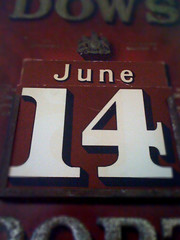In Media, PR and marketing (inc online pr and online marketing) knowing what events are coming up can be quite important so you can swerve away from them or tag on to them. Internally, knowing what’s going on inside and out helps everyone to coordinate their actions too.
When does your marketing start for a product and when does it end, when do you do press for an event, what day will that press release go out, does it clash with anything internally and any event externally? We all know the Government trick of burying bad news with their news dumps on a Friday evening but the date and time of all communications is important for an organisation. Being able to get a quick overview of what is coming up is vital for a busy organisation big or small. This is where the communications calendar comes in.

Photo owned by Howdy, I’m H. Michael Karshis (cc)
Advantages of a comms calendar
The first advantage of a communications calendar is that in a glimpse you can see what’s happening internally and externally over the next few days, weeks and months. Another advantage is that when external events pop up you might be able to modify your communications instead of ploughing headlong into the event. Knowing you have buffers around a planned event brings in a level of comfort and makes you adapt to a situation while looking professional. You can easily scroll back and look at past events that worked and didn’t work and gain insight for the next event too.
What type of calendar?
I find Google Calendar or one of the other web based calendars to be excellent as you can share them with a group. Having them on a wall works well and maybe even creating an analog version of the web-based calendar can work but a digital shared version means no matter where your team is, they can access the data and update it if needs be. If you do go digital though, make sure to make backups just in case there are connection issues or data loss.
What should go into it?
Newspapers will have upcoming events in their business sections such as company AGMs, results announcements and key Government events like budgets. They ought to go into your calendar, especially if you think they will dominate the news the day they’re announced. Over time experience will tell you which of these is important.
Measure results
With the calendar in place you can measure the effects of campaigns days, weeks and months after they have started and ended. If you add in resources put into the campaign and the impact of it you can visually see the value of the campaign for you and clients. Visual clues can often allow you to make better and faster decisions too compared to looking at data in just a spreadsheet.
Originally written for the Cork Independent and modified for this blog.

Just as a related link, there’s a nice email marketing calendar on Toddle.com http://www.toddle.com/stuff/your-2010-online-marketing-plan/